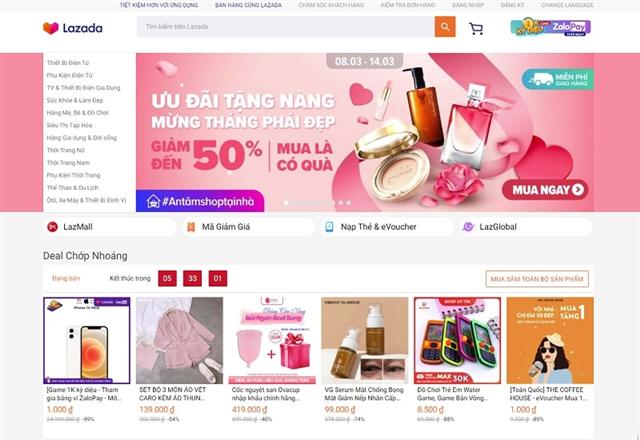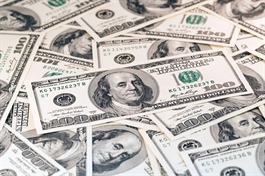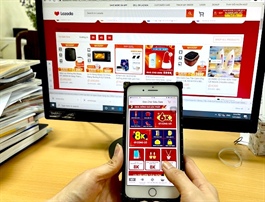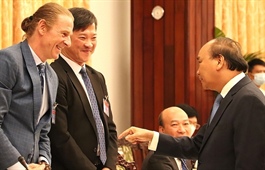Tightened regulations needed for rising e-commerce activity
Tightened regulations needed for rising e-commerce activity
Accelerating e-commerce management policies in Vietnam may be a necessary step to create an equal footing with physical retailers, but the multitude of trading platforms and a lenient approach may throw stones in the path of lawmakers.

Tightened regulations needed for rising e-commerce activity, illustration photo
|
Bruno Jousselin, managing director of MM Mega Market Vietnam, said that in comparison with e-commerce platforms, traditional retail businesses such as MM Mega Market have been fulfilling plentiful regulations related to goods.
“For now, when listing packaged products within any supermarket distribution system, these need to oblige with the strict regulations of the Vietnamese government and MM Mega Market Vietnam’s MM Quality Assurance Department,” said Jousselin. “Those include a quality profile – including self-declarations and documents proofing conformity with regulations – and labelling information that follows statutory requirements and shows the origin of products.”
In Vietnam, there are no official regulations requiring sellers to fulfil criteria regarding an item’s origin and quality. Furthermore, overseas vendors potentially take advantage of gaps in the legal framework and often sell low-quality goods. Most of the current e-commerce platforms are running under the customer-to-customer (C2C) model, playing an intermediate role, and have to be responsible for buyer-related problems. That is also the part of the reasons behind the rampage of fake and low-quality goods on the platforms.
Although some sites have been operating with business-to-customer (B2C) models, which forced them to take care of the goods’ quality of the end-users, the number of B2C vendors remains relatively small against the C2C ones. As a result, quality issues continue to grow.
Last month, intellectual property advisor Rouse based in the United Kingdom noted that Shopee “was reported by stakeholders in 2020 for allowing high volumes of counterfeit goods” including watches, clothing, food and beverages, and many more items. “Their platforms in Malaysia, Taiwan, Thailand, Indonesia, and Vietnam offer more counterfeit goods compared to other local national platforms,” Rouse said.
It stated that prominent issues with Shopee include “a lack of responsiveness, inconsistency, and failure to deter and apply a repeat infringer policy”.
Tran Tuan Anh, managing director of Shopee Vietnam, told VIR previously that the platform has constantly updated its filter system aiming to remove fake goods right after receiving notice. “We also focus on investing in infrastructure and specialised human resources to expand the ability of monitoring and managing selling activity,” he said.
In a move to redeem its reputation, Shopee together with competitor Lazada signed an MoU with several international and local brand owners in the Philippines, including Unilever Philippines, GlaxoSmithKline, Globe Telecom, and more. The MoU requires the e-commerce sites to restrict sale of counterfeit goods online “in a timely and efficient manner” when these are reported by brand owners, as well as to verify and maintain data of sellers and share any infringer’s information with authorities. A similar move in Vietnam could help Shopee regain some of its customers’ trust.
Recognising the various inadequacies in the legal framework, the local government since last year has carried out legal revisions. Earlier this month, the government approved the development of a decree about the customs administration on imports and exports through e-commerce transactions and assigned the Ministry of Finance and other agencies to build required regulations, with the first draft expected in the last quarter of this year. The Ministry of Industry and Trade previously published the amended Decree No.52/2013/ND-CP that supplements some responsibilities of the operators of e-commerce platforms where overseas vendors are running the business.
Assessing the potential efficiency of the amendment, lawyer Dang Van Cuong from Chinh Phap Law Office said, “Stiffening conditions in entering the market will enhance qualified merchants’ business in Vietnam, and also help to eliminate fraud on online shopping sites. Also, each platform is different, so local authorities should research carefully to complete the regulation.”
|
Local bubble tea supplier Idocean last week reported the vast appearance of counterfeits of its tea product “Hoa Tran so 9” on Shopee taking place over the last two years. According to the company, about 20 vendors have been selling the fake items, thus hampering sales of the authentic goods. As soon as Shopee received the feedback from Idocean, the e-commerce operator blocked every store selling the products – unfortunately even including the genuine ones. To date, the two sides have yet to reach an agreement on how to solve the problem. |


























